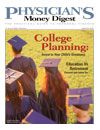Publication
Article
Physician's Money Digest
Look to the Future with Realistic Eyes
Having second thoughts about retiring early?Unfortunately, you may be forced to retireearly anyway, which means you need tomake some plans now while you still can.
Changing Trends
For years, people worked late into their life andthen enjoyed a short retirement. With the rise ofSocial Security and employer pensions, however,Americans started to retire well before age 65. Butwith a growing recognition by some that they don'thave enough saved for retirement, the notion of earlyretirement is beginning to fade for many.
In a recent survey by John Hancock FinancialServices of participants in 401(k) and defined-contributionplans, the average age that respondents saidthey expected to retire was 64. This is up from age 61in its 2002 survey and age 60 in its 1995 survey. Inaddition, almost two of five said they don't expect toretire until age 70 or older.
The annual Retirement Confidence Survey releasedthis spring by the Employee Benefit ResearchInstitute (EBRI) and the American Savings Councilalso found that the typical worker expects to workuntil age 65. Indeed, two of five workers surveyedsaid they plan to work beyond age 65. There's justone hitch to these expectations: reality.
Reality's Bite
Although working to or even beyond age 65 maybe desired, according to the EBRI study, the actualmedian retirement age is 62. The Center for RetirementResearch at Boston College attributes partof this retirement trend to the fact that people cancollect their first Social Security check at age 62,which entices them to leave the workforce.
More ominous is that many people are forcedout of the workplace earlier than they planned.According to the EBRI survey, nearly four of 10retirees left due to health problems or unemployment.Older people often quit work to provideunpaid care for a sick loved one. And even those whodo manage to work into their 60s—particularly peoplewho retire but go back to work—often find themselvesin low-wage jobs.
One alternative for older Americans is self-employment.An AARP study on self-employment found thata higher percentage of people age 50 and over is self-employedvs the overall workforce. Part of the explanationis that self-employment often serves as a transitioninto full retirement. But the AARP noted that many ofthose self-employed were pushed into the choice, oftenbecause of a work-limiting health condition.
Although postponing retirement or working duringretirement remains an option for many, it's a big riskto bank on. The better plan, financial planners say, isto convert from financial dependence to financial independence.This means recognizing some crucial realitiesof retirement, such as the age at which Americansare eligible for full Social Security benefits.
With increased life expectancies, retirees havemore years to fund retirement. And health care costsduring retirement are mushrooming, with Medicareon average paying only 55% of those costs. In lightof these harsh realities, and the reality that you maynot be able to work your way through retirement,the best strategy is to boost savings now whileyou're still working and still have some time forthose savings to grow.
This article has been produced by the Financial Planning Association (www.fpanet.org), the membership organization for the financial planning community.
